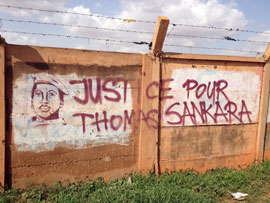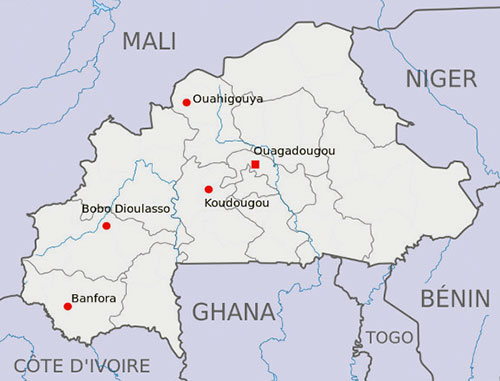|
|||
THOMAS SANKARA & NEWS :

---------------------------------------------------
• Burkinabe ex-President Compaore charged in Thomas Sankara murder
aljazeera.com, April 13 2021
---------------------------------------------------
• Thomas Sankara : Man of Integrityafrika-news.com, Ynug Anabel, April 26, 2017
---------------------------------------------------
• Burkina Faso Begins Exhumation Of Thomas Sankara's Grave Nearly 30 Years After His Death
tbtimes.com, Aditya Tejas, May 26 2015
---------------------------------------------------
• Thomas Sankara remains: Burkina Faso begins exhumation
bbc.com, 25 May 2015
---------------------------------------------------
• "We want the truth!" Burkina Faso exhumes graves marked for ex-leader Sankara, his followers
usnews.com, BRAHIMA OUEDRAOGO, Associated Press May 25, 2015
---------------------------------------------------
• Burkina Faso opens graves to answer questions about Thomas Sankara
theguardian.com, Associated Press, 25 May 2015
---------------------------------------------------
• "Burkina Faso's revolutionary hero Thomas Sankara to be exhumed"
theguardian, 6 March 2015
---------------------------------------------------
• "Citizens' Revolt in Burkina Faso"
african-futures, Ernest Harsch, December 9, 2014
---------------------------------------------------
• "Burkina Faso profile"
BBC.com, 2 November 2014
---------------------------------------------------
• "Power struggle in Burkina Faso after Blaise Compaoré resigns as president"
The Guardian, David Smith, 1 November 2014
---------------------------------------------------
• Burying Africa's hopes: remembering Thomas Sankara, the revolution and how Blaise Compaoré stole it all
Joan Baxter, November 1, 2014
---------------------------------------------------
• "Burkina army imposes interim government after crowd burns parliament"
Reuters.com, Mathieu Bonkoungou & Joe Penney, 30 October 2014
---------------------------------------------------
• "Burkina Faso: A Thousand Sankaras Come of Age"
thinkafricapress.com, Brian Peterson, 15 August 2014
---------------------------------------------------
• "Thomas Sankara"
Britannica.com, Carina Ray, 12 December 2013
---------------------------------------------------
• "Thomas Sankara And The Assassination of Africa's Memory"
saharareporters.com, Chika Ezeanya, 15 October 2013
---------------------------------------------------
• "Who killed Thomas Sankara?"
africasacountry.com, Shamira Muhammad, 14 March 2013
---------------------------------------------------
• "25 Years On: The Mixed Legacy of Burkina Faso's Thomas Sankara, Socialist Soldier"
thinkafricapress.com, Peter Dörrie, 15 October 2012
---------------------------------------------------
• "Sankara's Tomb Vandalised In Burkina Faso Capital"
AFP, 29 July 2011
---------------------------------------------------
